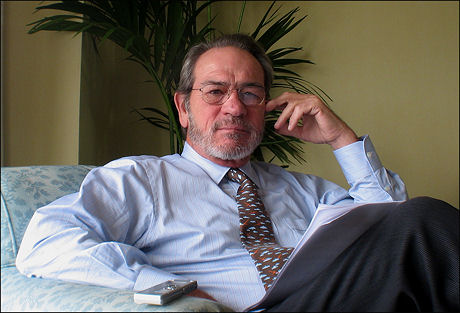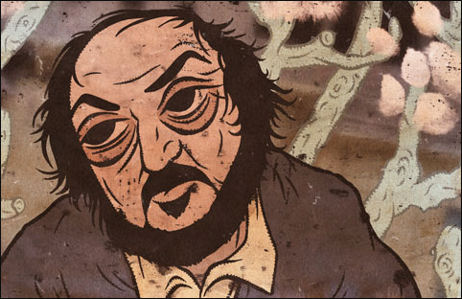Sad News
I tried finding out what the real Owen Wilson situation might be from sources after I heard the reports around 9:15 pm, but I started too late in the evening. When Joe Leydon called to ask what I knew (not knowing himself what had or hadn’t happened), my first reaction was “oh, God.” I’m very sorry if it’s true, and may the worst of it (whatever “it” might be) be over. A little recovery, and then on to Darjeeling Limited press duties, making Justice League, etc. Life isn’t perfect but you have to live it anyway.
“Youth in Revolt” script
Gustin Nash‘s 125-page screenplay based on C.D. Payne‘s Youth in Revolt. The film will star Michael Cera (the wry, moralistic, level-headed thin guy with the I’m-only-partially-here personality in Superbad — I’m explaining because he’s not a household name) as “Nick Twist” when it goes before the camera sometime…I don’t know when it’s going before the cameras.

The drive and industriousness in getting hold of this script is equally matched by my laziness in having failed to read it despite it being on my dining-room table for neary two weeks
“Bourne” vomit in the room
Shaky-cam Bourne vomiting has been brought up by Roger Ebert by way of a letter forwarded by David Bordwell (“the most respected film academic,” Ebert says) that was posted on movies.com a while back by “sfjockdawg,” to wit:

“We went to see The Bourne Ultimatum on the IMAX in San Francisco. Near the end, when Webb is having the flashback to when he [was] forced to show his commitment to the project, the lady next to me spontaneously unleashes a huge amount of vomit all over my leg and all over the floor in front of her! I’ve never experienced anything like it in my life! All the action sequences, the nauseating use of moving cameras and the relentless score were enough to make anyone dizzy, but to throw up?”
Like Jason Bourne himself, this item triggered a repressed memory in the brain of yours truly — a vomit-splatter that happened during an early-ish screening of The Bourne Supremacy on 7.12.04.
Sometime during the third act of a showing at the Writers Guild theatre, an older woman sitting on the left side spewed on the floor. It was kind of alphabet soup-y mixed with pumpkin puree and chopped Spanish peanuts. A few people got up and moved away. A guy who was sitting nearby told me later it smelled pretty awful in that section of the room.
The next day I mentioned the episode to a Universal publicist in an e-mail, not as something that was necessarily caused by Paul Greengrass shaky-cam but as something funny that had merely “happened.” I was chuckling the way a fifth- grader would chuckle with his friends if the really smart girl with the freckles and the pigtails had vomited in arithmetic class, but the publicist wasn’t in fifth grade — she was coming from the office of Roy Cohn during the Army-McCarthy hearings.
Her voice shrill and agitated, she read the riot act in order to dissuade me from mentioning the incident in the column. I felt so overwhelmed with bludgeonings and bad vibes that I caved (wimp that I am deep down) and said, “Okay, all right…good God.”
Only now, three years and 40 days later, can the story be told.
I’m wondering if Roger Ebert would have gotten the same phone call and had to deal with the same agitation from this very willful publicist if he were based in Los Angeles and had been in the Writers Guild auditorium on Doheny that fateful night.
Spilled coffee
True story, no names, happened a few years ago: A big-name actor is being driven out to a location shoot in a rural area with a producer, a p.a. and someone else. The actor has a styrofoam cup with steaming black coffee in his hand. The producer, sitting next to the actor in the back seat, reminds that they’ll be driving on a dirt road filled with big potholes, and that he needs to put a plastic top on the cup or else.

The actor says nothing, but it would be putting it mildly to describe the look he gives the producer as “hostile.” The producer drops it, turns away…whatever.
Ten minutes later they’re into the potholes and sure enough they hit a big one and almost half of the actor’s coffee spills on his lap. Right on his balls. Big dark stain. You can almost see the steam coming off his pants, but the actor just sits there, looking out the window and sipping what remains of the coffee — not a yelp, not a word. Because admitting he was wrong in ignoring the producer’s advice would be totally unthinkable.
Montecito road & dancers

Somewhere to the east of San Ysidro Road in Montecito, just east of Santa Barbara, on the way back from a birthday party for Santa Barbara Film Festival director Roger Durling — Saturday, 8.25.07, 7:25 pm; whenever people over the age of 30 start in with the orgiastic dancing and going “whoo-whoo!” at a party I always get depressed and want to leave.
Looking back at “Revolutions”
We’re approaching the four-year anniversary of the final collapse of the Matrix theology that came with the 10.27.03 release of The Matrix Revolutions. Too bad it’s not the fifth anniversary or I could tap out a stock-taking piece. It was a pretty amazing meltdown; hard to believe it all happened the way it did.

Are the second and third Matrix films still the most despised and discredited franchise films ever made? Is there anyone in the world except for the 300 or 400 remaining Wachowski geeks out there who’s even watched Matrix Reloaded or Matrix Revolutions on DVD over the past three or four years?
I wrote a piece called “Neo Schmeo” that summed it all up back in October 2003:
“I never would have guessed after getting my first look at The Matrix — a movie that freed my heart and made me levitate — that the sequels-to-come would turn out as badly as they have.
“Now the word is spreading like a huge fart and it’s all over but the revenues. This franchise went spiritually belly-up after the release of The Matrix Reloaded last summer, and now here’s The Matrix Revolutions to drive the final stake in and kill it for good. The legend, the faith, the magic…dead.
“You may be able to figure out most of what’s going on in Revolutions…or not. Point is, if your experience is anything like mine you’re going to stop caring anyway because you’re going to find yourself realizing with a jolt you’re totally done with looking at Carrie Ann Moss and fat Larry Fishburne doing that deadpan superhero thing in those shades and leather outfits.
“It hit me around 25 minutes in. I said to myself, ‘I’m done. I don’t want to watch this shit any more…ever.” I see the Matrix Reloaded DVD on the shelves at my local DVD store and a thought never even occurs to me about renting it. I don’t want to look at a scene, a snippet…nothing.
“I could go on for six or seven paragraphs trying to pick through what made sense to me and what I’m still trying to figure out, but why should I write anything in this column that will pay even an oblique tribute to something I believe everyone should wash their hands of?
“I saw Keanu Reeves in Nancy Meyers‘ Something’s Gotta Give last night (i.e., Monday) and I was so grateful he wasn’t wearing his leather Neo outfit I almost teared up. He looked so normal and natural and regular guy-ish. Considering the metaphorical implications made me feel light in the head.
“It doesn’t matter what Revolutions makes. Either it gets people where they live (like The Matrix did) or it doesn’t. Millions are going to go this weekend and what of it? Ticket sales don’t mean anything. Not with big-studio tentpolers.
“The Matrix Revolutions is like a bowl of narrative spaghetti, meant to be savored (I presume) for being a wonderful tangle that geek boys can dive into and try to put together in some fashion. But there is no one strand that leads to any kind of thematic core or foundation that seems to support the whole thing. The story hasn’t been told — it’s been heaped upon us like some kind of bizarre attack of live pasta and CGI squid.
“The big attack sequence on Zion is too overwhelming to make much of an impact. Too many millions of sentinels, no way of keeping score, and I don’t want or need this in my life.
“”I know this: When inquiring minds feel they need to compare notes in order to get their heads straight about what may or may not have happened story-wise, which I was doing with friends in front of the Fox Village last Thursday night and then on the phone and internet after that, the movie hasn’t done its job.. Journo after journo raised their eyebrows and gave me that ‘look’ after the all-media screening.
“One guy said, ‘Oh, well…!’ Another said, ‘I hated it!’ Another said, ‘Who was that big Wizard of Oz guy with the big deep voice at the end? Where was he during the last two installments…?’
“The single best bit in the whole thing is when Neo tries running on foot out of the train station, and finds himself right back where he started a second later.
“The second best scenes in the film both belong to Hugo Weaving. His scene with the Oracle, and his scene at the end when he talks about the meaninglessness of it all, blah, blah. That was great.
“They should have left it alone with the original The Matrix, and been proud of that triumph, and gone on to something new and fresh. But no — Joel and the boys and Keanu Reeves wanted to make all that money. And money’s all they’re going to get.”
Jones talking about stuff
You’d have to be a damn fool journalist to walk into a room with Tommy Lee Jones without knowing that he doesn’t suffer fools. He just doesn’t like to piss around, or so I’ve been told. He’ll talk professional fundamentals — work, focus, creative decisions he’s made — but he feels that politics is personal, and that personal stuff is too personal for words. Jones sometimes looks like he’s studying you, and half the time like you’ve just asked something pretty dumb. I was a little intimidated, to be honest.

In The Valley of Elah star Tommy Lee Jones at Four Seasons hotel in Beverly Hills — Saturday, 8.25.07, 11:45 am; bigger portrait shot.
But he does listen carefully and responds with at least a portion of his enormous intelligence. I know the stories about him, but he’s my idea of a decent guy. Plus he had a nice suit on with a beautiful pair of black Italian lace-up shoes.
The real bottom line is that Jones is unpretentious and frank and as straight as they come, and right now he’s the quintessential soul man — the mythical older Texas guy with creases in his face and all kinds of regret and guilt in his eyes — of American cinema right now. The proof is in his performances in In The Valley of Elah and No Country for Old Men. Here’s our ten or eleven-minute chat.
Kubrick and the muck
Charles Mudede, a dispenser of tight, clean sentences and un-minced thoughts, has written a short unambiguous piece for The Stranger, “Seattle’s only newspaper,” about what a misanthropic hard-case Stanley Kubrick was.

“Kubrick hated humans,” Mudede begins. “This hate for his own kind is the ground upon which his cinema stands. As is made apparent by 2001: A Space Odyssey, his contempt was deep.
“It went from the elegant surface of our space-faring civilization down, down, down to the bottom of our natures, the muck and mud of our animal instincts, our ape bodies, our hair, guts, hunger, and grunts. No matter how far we go into the future, into space, toward the stars, we will never break with our first and violent world. Even the robots we create, our marvelous machines, are limited (and undone) by our human emotions, pressures, primitive drives. For Kubrick, we have never been modern.
“‘I’m in a world of shit,’ says Private Joker at the end of Kubrick’s unremittingly dark Vietnam War film, Full Metal Jacket. That is what Kubrick has to say about the state of everything: The world is shit, humans are shit in shit, life is worth shit, and there is nothing else that can be done about the situation. In Kubrick’s movies, progress, sustained enlightenment, and moral improvement are impossible because the powers of reason, love, and religion are much weaker than the forces of generation and degeneration, desire and destruction, sex and death.”
Kirk Douglas, who worked with Kubrick on Paths of Glory and Spartacus, once described him as “Stanley the prick.” He wasn’t referring to the misanthropy, and he conveyed this opinion with a smirk. But I’ve never forgotten the moment when he said this, which was late in the afternoon as we stood outside Elaine’s sometime in the late summer of 1982, just as a Bobby Zarem press party for Eddie Macon’s Run, in which Douglas costarred, was breaking up.
Walking out on stinkers
In an 8.26 N.Y. Times essay about Norman Mailer‘s Maidstone, Gerald Howard reports that the legendary film critic Pauline Kael once called Mailer‘s Wild 90 “the worst movie that I’ve ever stayed to see all the way through.” Thus, Kael implied, she’d walked out on other bad movies with at least some regularity. (I remember reading a long time ago about her walking out on Raise the Titanic, muttering “life is too short.”) There will be those who will say “no, this does not bestow a respectable distinction to walking out on stinkers as a general practice,” and that is their right as American citizens.
Is Hollywood America?
“There may be an underlying notion of Hollywood as a tool of a cultural imperialism that, however murkily, reflects the actual imperialism of U.S. foreign policy. Follow that logic far enough and Hollywood flicks aren’t just dopey time-killers — but sermons straight from the bully pulpit.” — from an 8.24 Guardian piece by Danny Leigh titled “Is Hollywood America?”
Strange bedmates
A barbed, X-Acto knife review of Justin Theroux‘s Dedication (Weinstein Co., expanding 9.14) came yesterday from N.Y. Times reviewer Jeanette Catsoulis, with a brilliant opening graph that touches on the relatively new movie-plot phenomenon of genetically impaired low-tide males winding up for no earthly reason with hotties who would never give them a second glance in real life.

Billy Crudup, Mandy Moore in Justin Theroux’s Dedication
“That weird exhalation you hear at the multiplex these days is the sound of female characters settling for less than they deserve,” Catasoulis writes. “Following on the wildly successful anti-feminist heels of Knocked Up, Hollywood is falling over itself to introduce beautiful, smart young women to useless, possibly brain-damaged young men. Regular bathers need not apply.”
Seth Rogen bedding and developing a fruitful relationship with Katherine Heigl in Knocked Up. Jonah Hill ending up in a possibly promising relationship with Emma Stone‘s “Jules” at the end of Superbad. Dane Cook, a very convincing animal-sociopath in Mr. Brooks and a guy who’s exuded a kind of frazzled dork quality all along, romantically pairing off with “penguinologist” Jessica Alba in the forthcoming Good Luck Chuck. Will Ferrell ending up with Maggie Gyllenhaal in Stranger Than Fiction. Any others?
These quizzical pairings are happening because the director-producer-writers behind these films obviously want to see inappropriate guys hooking up with saucy attractive women. One reason is that it’s pleasing to slovenly dorky guys to think that hotties will fall for them under the right circumstances Another is that Judd Apatow, who doesn’t see himself as a Cary Grant type, has a very pretty wife.
I also think these pairings reflect current sociology to some degree. I can’t tell you the number of times I’ve seen extremely foxy younger women walking down supermarket aisles with guys who, by my standards, are far, far below them in terms of attractiveness. There’s nothing wrong with a guy being 157 miles away from being GQ cover material, but when he’s paired off with a girl who’s an 8.5 or a 9, something’s weird. You know the kind of guy I mean…thirtysomethings shuffling around in cutoffs and sandals (with funny-looking unpedicured toes) and squiggly man-beards and bodies that haven’t seen a gym in a good ten years.

